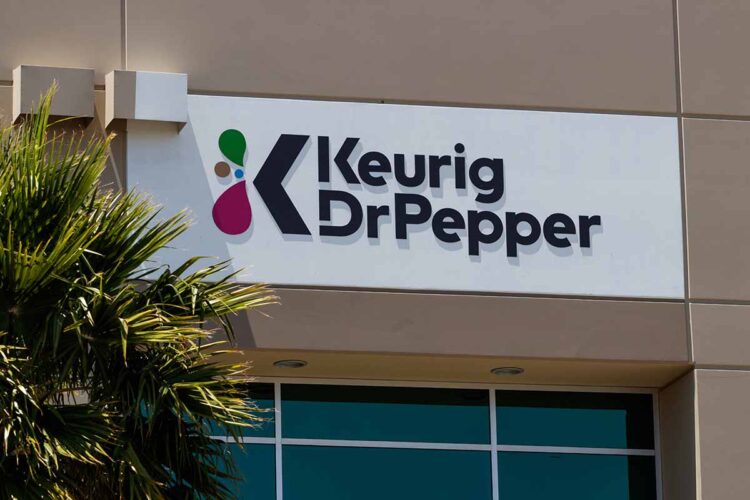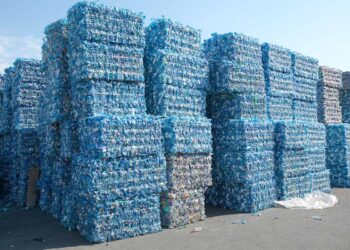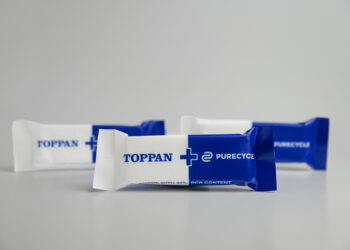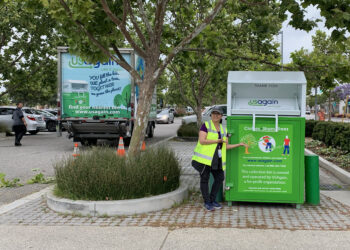North American beverage company Keurig Dr Pepper has seen progress toward most of its 2025 plastic-use targets, according to its 2023 Corporate Responsibility Report.
Although the share of PCR used in the company’s plastic packaging fell in 2023, overall plastic packaging used was 5% lower year over year, Keurig said in the report.
This was despite growing market share in refreshment beverages including carbonated soft drinks, according to the company’s full-year 2023 financial results, which were released in February.
Progress toward goals
The report combines progress toward its 2025 goals for its entire packaging portfolio – including plastic, paper, metal and glass.
In 2023, 95% of its packaging was recyclable or compostable, up one percentage point from 2022. The goal is 100% by 2025.
As for post-consumer recycled content, the company notched a share of 27% in 2023, up from 24% the previous year and inching closer to its 2025 goal of 30%. However, when looking just at plastic packaging, those post-consumer rates are lower: 17% in 2023, down from 18% in 2022. Keurig Dr Pepper’s goal is 25% by 2025.
The 2023 share of PCR represents a sharp increase from 2019, when PCR use was negligible, the report showed. In 2019, the company was using just 0.4% PCR across its plastic packaging portfolio, then peaked at 18% in 2022 before falling to this year’s level of 17%.
Looking at overall plastic use, Keurig Dr Pepper used 230,000 metric tons in 2019, of which 229,999 metric tons were virgin resin, respectively. By 2022 the tonnage had increased to about 247,000 metric tons (about 203,000 metric tons virgin) but then fell to about 234,000 metric tons in 2023 (195,000 of which was virgin resin).
Another goal is to reduce virgin plastic use by 20% by 2025. In 2023, it reduced its use by 15%, compared to 11% in the prior year. The baseline year is 2019, the year the targets were set
One strategy to reduce plastic was lightweighting of K-Cup coffee pods, reducing plastic in each pod by 18%, and removing polypropylene discs in some pods, eliminating 14 million pounds of virgin plastic in 2023, the report said.
Of the company’s packaging mix, the largest share in 2023 was PET bottles at 27%, followed by aluminum and steel at 13%, non-refillable glass bottles at 8% and PP at 7%.
Other materials including flexible packaging and plastic film, as well as refillable glass bottles, made up the remainder. Each material’s share has experienced little change since 2019, the report showed.
Ongoing challenges
As the 2025 targets approach, Keurig Dr Pepper cited continuing headwinds including an evolving policy and regulatory landscape, an inconsistent and underdeveloped recycling infrastructure, and fragmented state and federal policies.
For example, not all areas accept post-consumer PP for recycling, the company said.
“This is often due to outdated recycling infrastructure or lack of equipment that can effectively
sort polypropylene plastic. We are working with individual communities and recyclers
so more consumers can recycle their pods in local community recycling programs through investment, collaboration and advocacy,” the company said in the report.
K-Cup pods are made from PP. In 2022, the company – then known as Keurig Green Mountain – settled a class-action suit for $10 million regarding coffee pod recyclability claims. The same year, Canadian officials forced Keurig Canada to alter its recyclability claims and pay about $2.37 million U.S. in penalties. Beverage makers PepsiCo and Coca-Cola also have faced recent state lawsuits concerning plastics.
Looking ahead, opportunities include collaborating to secure federal packaging collection policy or other national-level mechanisms to help coordinate a circular economy.
The company’s senior director of sustainability, Charlie Schwarze, is board chair of Circular Action Alliance, a producer responsibility organization that administers the extended producer responsibility programs for Colorado and California. The group, which also includes Coca-Cola, General Mills and Procter & Gamble, among others, aims to be the approved PRO in all states with EPR for paper and packaging.
In addition to changes to its packaging materials, the company made efforts to increase consumer participation in recycling. Updated bottle labels helped to make recycling instructions more visible and to encourage “recycle right” consumer behavior, the report said.





























